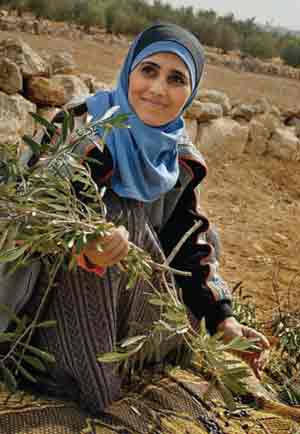Oxfam Report on Olive Farming in the West Bank
 The Road to Olive Farming
The Road to Olive Farming
Challenges to developing the economy of olive oil in the West Bank
Summary
For thousands of years, the olive tree has been an integral part of the Palestinian landscape: a symbol of Palestinian identity, culture and tradition. The majority of Palestinian farmers are at least partially dependent on olive cultivation. The current profitability of olive farming is evident in the increase in recent years of farmers who are planting new trees and tending to their orchards. In a good year, the olive oil sector contributes over $100 million income annually to some of the poorest communities. Olive cultivation also has strong social and political aspects, as the planting of olive orchards is often an attempt to prevent the confiscation of land by Israel or settlers and to protect Palestinian livelihoods.
“THE OLIVE TREES ROOT AND ANCHOR US IN OUR LAND, PROVIDE A SENSE OF BELONGING, HOME AND HOPE. INVESTING IN OLIVE OIL IS INVESTING IN OUR FUTURE.” ABU SULEIMAN, OLIVE FARMER FROM THE VILLAGE OF IMMATIN
While the olive oil sector significantly contributes to economic security and generates income and employment, numerous obstacles prevent the sector from realising its full potential. A lack of adequate resources and ineffective sectoral management coupled with environmental factors, poor production and quality practices have caused stagnation in the development of the sector.
Donors and NGOs need to work with the relevant Palestinian authorities and all stakeholders to develop an effective strategy and improve coordination and regulation of the sector. With the right investments, and the adoption of improved agricultural practices, Oxfam estimates that the productivity and therefore the incomes of olive farmers could double.
Practices that improve the quantity and quality of olive oil combined with improved marketing skills could increase local market share and unlock the growing global market to more Palestinian olive farmers. Increased productivity would ensure the stability of prices for olive oil on the domestic market and increase the surplus available for export (which always exists in years of high production). Through improving the quality of olive oil, Palestinian farmers have potential to become leaders in organic and Fair Trade markets. Whilst these niche markets are relatively small globally, they do provide additional marketing opportunities for Palestinian farmers, and the higher prices that make Palestinian olive oil more competitive.
Yet, such investments are meaningless unless Israel, which has occupied the West Bank since 1967, refrains from actions that restrict Palestinian farmers from access to their land and means of livelihoods. The range of physical, logistical and administrative impediments imposed by Israel on Palestinian farmers and traders leaves limited access to local, national and export markets, and prevents the full implementation of international trade agreements.
Oxfam has a long history of assisting olive farmers in Palestine. With funding from the European union, we are currently helping farmers improve farming practices and open local, regional and international markets to their products. This report shares the learning, success and challenges Oxfam and its partners have faced over a number of years. We believe that if the Palestinian Authority, Israel, the international community, donors and NGOs address the issues outlined in this report the future for Palestinian olive farmers looks bright.
